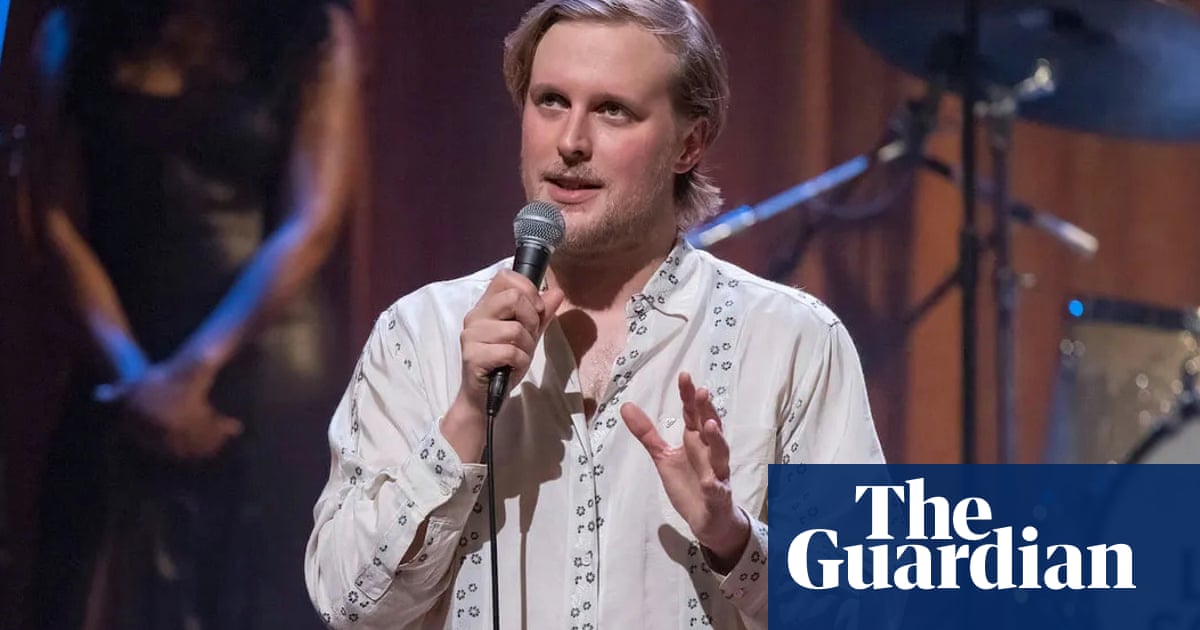There was a time when comedians weren’t just about the jokes, they were about the crooning, too. I sawKen Dodd showsback in the day where he broke up the tattifilarious nonsense with sentimental ballads and wartime songs. Can you imagine a 21st-century comic doing anything so uncool? Reader, you no longer have to – as one of the coolest comedians in the world wings his way to London with a show as much about the heartfeltchansonas the layers-of-ironic millennial bantz.
The man in question is John Early, scene-stealing camp superstar of theHBO comedy-thriller Search Party, and sidekick to another whip-smart standup brain,Kate Berlant. Like Berlant – and likeCatherine Cohen, Bo Burnham or theUK’s own Leo Reich– Early’s work fashions the navel-gazing, always-online, identity-as-performance spiritual anomie of his generation into outrageous comedy. Or at least, he does in his screen work. Onstage, it’s a bit different, and includes straight-bat performances of pop/rock standards with the backing of six-piece band the Lemon Squares. “In the beginning,” he says, “I just felt, ‘wouldn’t this be groovier if I did this with a full band? Wouldn’t it be fun to do a Britney Spears song with a 70s-inflected arrangement?’”
Back then, the songs were – like everything else – a part-ironic posture. “I would immediately find some jokey delivery to protect me through the song.” But things changed when Early recorded his first special last year.Now More than Everincludes a celebrated 16-minute routine lamenting the millennial generation’s wasted youth, spliced with a plangent performance of the Neil Young number After the Gold Rush. “That was a choice I made that changed my life,” says Early now, chatty and self-deprecating over a transatlantic Zoom. “I always used to trust the audience to find the humanity underneath the irony. But people didn’t often see that part of it, for some reason. Maybe today you can’t trust them to, because we live in such an antisocial time, and people are so ‘mallet to the brain’ by the internet.”
“So with After the Gold Rush, for the first time ever, I fully just spoon-fed it. It was ‘this is me baring my soul’.”
It was the songs wot done it – so much so that Early subsequently released the show as an album. “It’s actually a very old cultural instinct, funny people doing sincere covers. Those are my heroes: the Bette Midlers, the Sandra Bernhards.” In the olden days, comedians performed sincere songs because the art form itself couldn’t handle sincerity. That changed as comedy matured – but changed back again, Early argues, with millennials, so lost in irony’s hall of mirrors, they must turn again to song to help free themselves. “I am part of a generation of people that are like stuck together, a bunch of internet phrases that have been Frankensteined together. Singing takes you out of this poisonous, ironic-banter internet speak and lets you sit in time for three or four minutes, being wistful or sincere.”
One might marvel that a lifelong satirist of millennial self-fashioning should himself feel trapped by it. But that’s not all Early had to contend with. A self-described “good Presbyterian boy”, the son of church folk in Nashville, Tennessee, Early ascribes much of his work – ie portraying himself as “a narcissistic monster” – to that background. “I always thought there was something gross about portraying yourself in a flattering light,” he says, and so developed an oeuvre – his role as Elliott in Search Party prominent within it – that accentuated his “psychotic, anxious, socially oppressive” tendencies. Away from the cameras, meanwhile, he delivered standup that felt like “a safe way for me to actually be myself, to use the parts of me that are good at bringing people in and making them comfortable.”
For years, he resisted broadcasting that live work, because “I felt very allergic to putting a camera on that.” With Now More than Ever, he finally did so – and it came as a cathartic release. “Because you can only take the monster for so long. It gets a little grating after 10 years of that.”
All of which explains why London audiences are getting a rare glimpse of Early’s live work this spring. “Doing these shows has been very meaningful to me,” says the 37-year-old. “I get schmaltzy on tour, I really love doing it. And as the [US] tour was ending I was like ‘we have to keep going! It can’t be over!’ So we booked these London shows.” Content-wise, “I don’t want to promise anything too coherent,” he says, but it’ll be “my usual bloated, sweaty, wild show,” with guest appearances from his YouTube and Netflix “southern Christian mom alter egoVicky with a V. She will do – I was going to say a surprise set, but I’ve just given it away.” For comedy fans, it’s a must-see – and perhaps, after all these years of Early hiding between inverted commas, worth a look for sincerity fans, too.
John Early: The Album Touris at Soho theatre Walthamstow, London, 28-29 May
